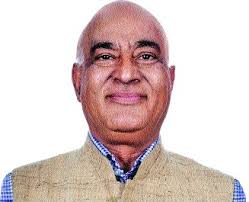Synchronised elections, voter behaviour, and governance outcomes
An active policy proposal of the Government of India is to hold national elections at the same time as the assembly elections of all the states. This article examines whether holding national and stat...
-
 Vimal Balasubramaniam
Vimal Balasubramaniam  Sabyasachi Das
Sabyasachi Das  Apurav Yash Bhatiya
Apurav Yash Bhatiya  28 August, 2020
28 August, 2020
- Articles
Political determinants of newspaper markets in India
Newspapers are an important source of political information for Indian voters. This article looks at how political factors influence the newspaper market. Using the announcement of delimitation in the...
-
 Julia Cagé
Julia Cagé  Guilhem Cassan
Guilhem Cassan  Francesca R. Jensenius
Francesca R. Jensenius  23 November, 2023
23 November, 2023
- Articles
A proposal for public funding of elections and political parties in India
The Finance Minister of India recently introduced measures aimed at cleaning up political party funding in the country. In this article, Gowda and Santhosh highlight the limitations of these measures,...
-
 M.V. Rajeev Gowda
M.V. Rajeev Gowda  Varun Santhosh
Varun Santhosh  21 April, 2017
21 April, 2017
- Perspectives
Covid-19: Is it time to decentralise power?
Raghuram Rajan speaks to Econ Film’s CoronaNomics show, on the merits of de-centralised governance in the battle against the Covid-19 pandemic, how local authorities can be empowered, and the risk o...
-
 Raghuram Rajan
Raghuram Rajan  24 July, 2020
24 July, 2020
- Videos
The politics of post-retirement appointments: Corruption in the Supreme Court?
The Indian judiciary bats for judicial independence. Wary of executive interference, judges ferociously protect their institutional turf. But does India’s judicial system suffer from an underhanded ...
-
 Madhav Aney
Madhav Aney  Shubhankar Dam
Shubhankar Dam  Giovanni Ko
Giovanni Ko  15 June, 2020
15 June, 2020
- Articles
Court congestion, caste identity, and business performance
Effective contract enforcement is the key for the formation and expansion of business enterprises. But how does improvement in court performance matter differently to different caste groups? This arti...
-
 Tanika Chakraborty
Tanika Chakraborty  Anirban Mukherjee
Anirban Mukherjee  Sarani Saha
Sarani Saha  Divya Shukla
Divya Shukla  14 May, 2020
14 May, 2020
- Articles
Kerala’s management of Covid-19: Key learnings
Kerala was the first Indian state to be affected by Covid-19 with the highest number of cases at one point in time, but today it has a flat infection curve and one of the highest recovery rates in Ind...
-
 S.M. Vijayanand
S.M. Vijayanand  02 May, 2020
02 May, 2020
- Perspectives
How district courts influence firm growth
The Economic Survey 2018-19 highlights that the single biggest constraint to ease of doing business in India is contract enforcement and dispute resolution, and increasing capacity in lower judiciary ...
-
 Manaswini Rao
Manaswini Rao  29 January, 2020
29 January, 2020
- Articles
Electoral cycles and incomplete public works projects: An analysis of the MPLAD scheme
The successful execution of public works programmes undertaken by governments often hinges on the completion of a vast array of local-level projects intended to create tangible amenities to improve th...
-
 Jonathan Darsey
Jonathan Darsey  Anjali Thomas
Anjali Thomas  08 January, 2020
08 January, 2020
- Articles
There are none so blind as they who will not see
Based on Government of India’s own data, the government and the community of economists in India have come up with different narratives about the position of Indian economy. In this post, Pronab Sen...
-
 Pronab Sen
Pronab Sen  16 December, 2019
16 December, 2019
- Perspectives
Pradhan Mantri Ujjwala Yojana: Issues and gaps in service delivery and access
The Pradhan Mantri Ujjwala Yojana is a much-needed and purposeful scheme, given the health hazards faced by women inside households as 79% of rural Indian households still depend on traditional unclea...
-
 Rahul Ranjan
Rahul Ranjan  11 December, 2019
11 December, 2019
- Perspectives
Do politicians receive special treatment in courts?
Do Members of Legislative Assemblies (MLAs) facing pending criminal cases receive favourable treatment in the Indian legal system? This article uncovers opposite effects of winning office, depending o...
-
 Rubén Poblete-Cazenave
Rubén Poblete-Cazenave  26 August, 2019
26 August, 2019
- Articles
Consent to nothing: Aadhaar-based payment systems in welfare
The process of seeding Aadhaar with bank accounts in order to link welfare schemes and cash transfers with Aadhaar payment systems, created chaos on the ground. In this note, Niklas Wagner and Sakina ...
-
 Sakina Dhorajiwala
Sakina Dhorajiwala  Niklas Wagner
Niklas Wagner  23 August, 2019
23 August, 2019
- Notes from the Field
How democratic are the states of India?
India is often credited for its success as the world’s largest democracy – but does the degree of democracy vary across Indian states? This article develops an index to map the development of subn...
-
 Jos Bartman
Jos Bartman  Imke Harbers
Imke Harbers  Enrike van Wingerden
Enrike van Wingerden  13 August, 2019
13 August, 2019
- Articles
Political alignment and economic outcomes: Evidence from legislative assembly elections in India
Theory suggests better economic outcomes prevail when providers at different levels of government are politically aligned. While politicians are jointly responsible for several policies, other policie...
-
 Sourav Sarkar
Sourav Sarkar  02 August, 2019
02 August, 2019
- Articles
Twitter feed
Tweets by Ideas4IndiaMost Popular Governance Posts
Unique Health Identification and Aadhaar: A case for mandatory linkage
As part of the Digital India initiative, All India Institute of Medical Sciences (AIIMS) issues a Unique Health Identification (UHID) number to each patient, which documents their entire journey in th...
 Mudit Kapoor
Mudit Kapoor  23 December, 2016
23 December, 2016
- Perspectives
Caste dominance in rural India: Cause and effect
Rural India remains a caste-based society. This column explores why caste continues to play such an important role and what the effects are. It argues that trade and agricultural productivity suffer, ...
 Siwan Anderson
Siwan Anderson  16 August, 2012
16 August, 2012
- Articles
Why did the Indian economy stagnate under the colonial rule?
How did the Indian economy fare under the colonial rule? Is the average Indian significantly better off after Independence? This column examines trends in GDP per capita in order to determine the stan...
 Aniruddha Bagchi
Aniruddha Bagchi  16 September, 2013
16 September, 2013
- Articles





 16 November, 2023
16 November, 2023






